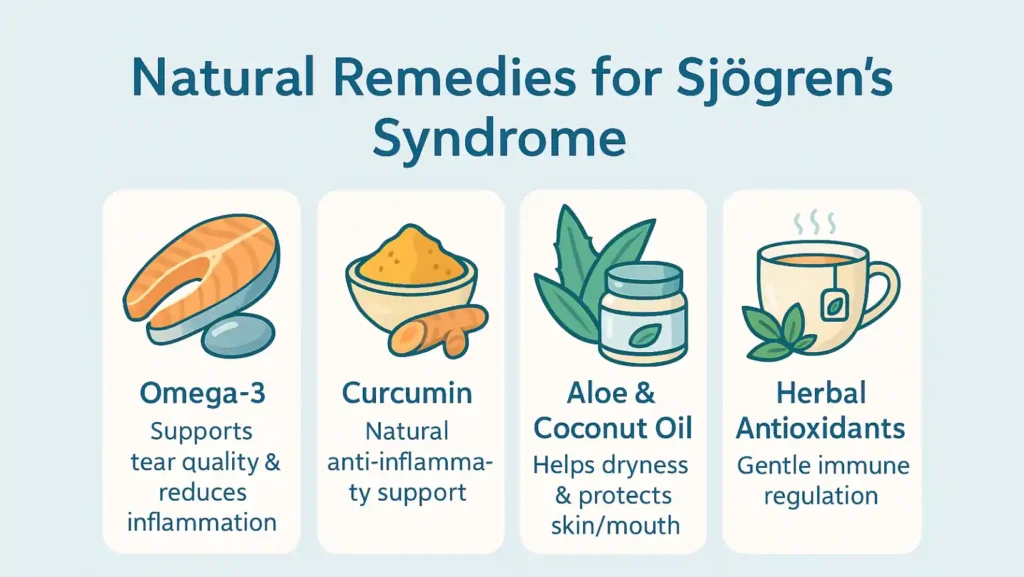Sjögren’s syndrome is an autoimmune disease. Your immune cells attack moisture glands and sometimes other organs. You feel dry eyes, dry mouth, fatigue, and joint pain.
A full plan can quiet the attack and protect tissue. You can reach remission. You can work, study, and stay active.
This guide shows the exact steps that help most people. It also explains how to cure Sjogren’s syndrome.
Table of Contents
ToggleWhat Is Sjögren’s Syndrome?
Autoimmune Causes And Immune System Malfunction
Your immune system should defend you from germs. In autoimmune disease, it misfires and targets your own cells. In Sjögren’s, the first target is the moisture glands. The lacrimal glands make tears. The salivary glands make saliva. Inflammation makes them weak. Eyes burn. Mouth feels sticky. Joints can ache.
Some people also see nerve issues. You may hear terms like “autoantibodies,” which are immune proteins that tag your cells by mistake. Doctors may test for SSA or SSB. A positive test can help confirm the diagnosis. A negative test does not rule it out.
Primary Vs. Secondary Sjögren’s Syndrome
Primary Sjögren’s stands alone. You have the dryness and the immune features without another major autoimmune disease. Secondary Sjögren’s comes with diseases like rheumatoid arthritis or lupus. Care is similar. Your doctor will still protect glands, manage pain, and watch organs. Secondary disease may need tighter follow-up because the two conditions interact.
How It Affects Glands, Joints, And Organs
Moisture protects tissue. Fewer tears raise the risk of corneal issues. Less saliva raises the risk of cavities and gum disease. You may get dry skin, a dry nose, and a dry throat. Joints can swell. Muscles can feel weak. Some people have lung, kidney, or nerve involvement. That is why you need a plan that blends local care for dryness with body-wide care for inflammation.
Can Sjögren’s Syndrome Be Cured?
Understanding Remission Vs. Complete Cure
A cure means the disease is gone with no ongoing care. Remission means very low activity with few or no symptoms. Today, remission is a realistic goal. A cure is not available. When you read “Can Sjogren’s syndrome be cured?”, answer with care. You can say no to a cure, yes to remission. You can also say that early action raises the odds of long periods with little trouble.
Real Patient Recovery Stories And Clinical Insights
People who feel well long-term share patterns:
- They use scheduled eye and mouth care.
- They eat in a way that keeps blood sugar steady.
- They sleep at regular times and protect their mornings.
- They move most days.
- They treat flares fast and adjust triggers.
- They keep dental and eye visits on the calendar.
- They review meds and supplements at each visit.
Put these in place and you are close to curing Sjogren’s syndrome. It is a stack of small wins, not one secret fix.
Why Early Diagnosis Improves Long-Term Outcomes
Early care protects the cornea, teeth, joints, and nerves. It lowers the risk of infections and ulcers in the mouth. It can also reduce long term fatigue. If dryness and joint pain persist beyond three months, ask for a workup. If you already live with another autoimmune disease, ask even sooner. This is not alarmist. It is simple prevention.
Symptoms And Early Warning Signs
Eye And Mouth Dryness Explained
Dry eyes can feel like sand. You may blink more. Light can hurt. Reading can blur after a few minutes. Dry mouth makes swallowing dry food hard. You sip water all day. Your tongue can feel rough. You may get mouth sores. These signs are common and respond well to scheduled care, not just as-needed drops.
Fatigue, Joint Pain, And Chronic Inflammation
Fatigue is not just “being tired.” It is an energy drain from immune activity. You can wake unrefreshed. Joints can feel stiff in the morning. Hands may swell. Pace yourself. Train your day in blocks with short rests between tasks. That reduces flares.
Digestive And Neurological Symptoms
Reflux, bloating, or constipation can show up because dryness affects the gut lining. Nerve symptoms can include tingling, burning, or numbness. Brain fog is common. When you calm inflammation and fix sleep, these often improve.
How Symptoms Differ By Gender And Age
Women are affected more often, but men can have it too. In older adults, symptoms may blend into normal aging. In teens or young adults, fatigue may look like school stress. If you see dryness plus joint pain or swelling, get checked. Do not ignore it.
How I Managed Sjögren’s Syndrome Naturally?
Read this section as a practical plan you can copy with your doctor.
Tracking Triggers And Managing Inflammation
Use a simple daily log. Note meals, sleep, stress level, screen time, and symptoms. Look for patterns. Common triggers:
- Long screen time without breaks.
- Rooms with very low humidity.
- High sugar snacks or drinks.
- Late caffeine.
- Poor sleep.
Cut what you can. Plan breaks every 30 to 45 minutes for the eyes. Keep a small humidifier at your desk. Your log will guide you better than guesswork.
Daily Routines To Improve Dryness And Fatigue
Set a schedule for eye care. Use preservative-free tears three to four times a day. Use a thicker gel at night. Chew xylitol gum to protect teeth and boost saliva. Sip water through the day. Do a short morning stretch to wake muscles.
Take a 10-minute walk after lunch to steady blood sugar. Keep the same sleep and wake times, even on weekends. These basics are not flashy. They work.
Stress Reduction And Sleep Management
Stress chemicals raise inflammation. You can reduce that with simple tools. Try 5 minutes of slow breathing. Inhale for four counts, exhale for six. Do this twice a day. Keep your room dark and cool. Put your phone away one hour before bed. Start a wind-down routine. Read a few pages of a light book. Dim the lights. Sleep is your strongest daily anti-inflammatory. Protect it.
The Role Of Hydration And Humidity Control
Dry air hurts eyes and sinuses. Aim for indoor humidity near 40 percent. Use a small meter to check. Clean your humidifier daily. Drink water or broth. Add electrolytes on hot days or after exercise. Balanced fluids help energy and mouth comfort.
Natural Remedies For Sjögren’s Syndrome
You asked for options that fit into daily life. These are the most useful natural remedies for Sjögren’s syndrome when used with medical care.
Omega-3 Fatty Acids For Dry Eyes And Inflammation
Omega-3s from fatty fish or fish oil can improve tear quality. Start with a low dose. Take it with food to avoid stomach upset. If you take blood thinners, ask your doctor first. Track eye comfort for four to six weeks. You should notice longer reading time without burnout.
Turmeric And Curcumin As Natural Anti-Inflammatories
Curcumin is the active part in turmeric. It may lower some inflammation signals. Choose a form with better absorption. Use the lowest effective dose. Take with meals. It is not a stand-alone fix. It joins the plan that supports curing Sjogren’s syndrome safely and realistically.
Aloe Vera And Coconut Oil For Skin And Mouth Dryness
Aloe gel soothes dry skin. Simple oils can seal moisture after a shower. For lips, use a plainbalm. For the mouth, choose saliva gels with xylitol. Do not swallow oils straight. Use products marked safe for oral use. The goal is to protect tissue while you treat the immune part.
Herbal Teas And Antioxidants For Immune Regulation
Green tea gives gentle antioxidants. Chamomile can calm. Ginger tea helps if you feel queasy. Eat berries, leafy greens, nuts, and seeds. These foods support cell repair. A steady diet helps more than a one-time cleanse.
Holistic Treatments For Sjögren’s Syndrome
This section covers options that support body and mind. Use them with your doctor. Done right, they can be part of a safe, holistic treatment plan for Sjögren’s syndrome.
Acupuncture For Salivary Gland Stimulation
Some people feel more saliva flow after a series of sessions. Choose a licensed clinician. Give it four to six visits before you judge. Track your mouth comfort and your need for lozenges.
Yoga And Mindfulness For Immune Balance
Gentle yoga reduces stiffness and supports lymph flow. Ten minutes daily is enough to start. Short, steady practice beats long, rare classes. Add two minutes of quiet breathing at the end. That trains your stress response to calm down faster.
Eliminating Inflammatory Foods And Allergens
Start with a simple four-week trial:
- Remove ultra-processed snacks.
- Cut added sugar.
- Limit refined flour.
- If you suspect dairy or gluten, remove one at a time for three weeks.
Then reintroduce and test your response. Use your log to check symptoms. Keep what helps. Drop what does not.
Gut Health Restoration For Autoimmune Control
Fiber feeds good gut bacteria. Eat beans, oats, chia, flax, and greens. Add fermented foods if you tolerate them. A calmer gut often means fewer flares. This is one more brick in the path people describe as a cure for Sjogren’s syndrome.
Best Supplements For Sjögren’s Syndrome
You asked for the strongest options. Use labs and doctor input. Build a short list. Quality beats quantity. These are often called the best supplements for Sjögren’s syndrome in balanced plans.
Vitamin D And Omega-3 For Immune Regulation
Ask for a vitamin D test. Correct low levels with a safe dose. Aim for the range your doctor recommends. Vitamin D supports immune balance. Omega-3s support eye comfort and lower some inflammation.
Together, they cover a large part of daily needs. Keep doses steady. Track energy, sleep quality, and eye comfort each week.
Probiotics For Gut And Inflammation Balance
Look for blends with Lactobacillus and Bifidobacterium strains. Start low for one to two weeks. Increase if you tolerate it. If gas or bloating show up, step back. Probiotics work best with fiber-rich food. They are not a pass for a poor diet.
Many people add them to a plan that also includes how to manage Sjögren’s syndrome through sleep, movement, and hydration.
Zinc, Selenium, And Magnesium For Gland Support
Zinc supports mouth and throat tissue. Selenium helps antioxidant systems. Magnesium supports sleep and muscle calm. Use safe ranges. Do not stack products with the same mineral. Bring your full list to each visit. Your care team will check for interactions with prescriptions.
B-Complex Vitamins For Nerve And Fatigue Management
B12 and folate help nerves. B6 helps energy pathways. If you have numbness or tingling, ask for level checks. A balanced B-complex can fill gaps while you adjustyour diet. Take with breakfast to avoid nausea.
Medical Treatments That Helped
Medical care plays a major part in my path to remission from Sjögren’s syndrome. Natural steps help, but the immune system attack still needs guidance. A doctor can choose the right medicines to bring inflammation down. The goal is not heavy medication forever. The goal is to calm the immune system so your daily habits can keep symptoms low.
Prescription Medications For Dryness And Inflammation
Some medicines can help your glands work better. Two common ones are pilocarpine and cevimeline. They help saliva flow. They may also help tear flow. They do not work for everyone. They can cause sweating or flushing. If the dryness in your mouth makes eating hard, ask your doctor if these might fit.
Hydroxychloroquine is often the first medicine for joint pain and fatigue. It helps lower immune irritation. It usually takes a few months to show an effect. It is safe for most people with correct eye checks once a year. Reaching remission from Sjögren’s syndrome includes hydroxychloroquine as a part of the starting plan.
Artificial Tears, Saliva Substitutes, And Nasal Sprays
You support your glands by replenishing moisture throughout the day. Use preservative-free tears four times daily. Gel tears at night help the eyes rest. Saliva gels and xylitol lozenges protect your teeth. Saline sprays help your nose stay moist. Do these on a schedule. Do not wait for dryness to get severe. The goal is prevention.
Immunosuppressants And Biologics
Some cases need stronger medicines. Methotrexate, mycophenolate, azathioprine, or biologics may be used when joints or organs are involved. These calm immune activity. They require lab checks. Not everyone needs them.
But when inflammation is high, these medicines help protect organs. That protection allows you to build steady habits. Without organ protection, daily changes are not enough. A strong holistic treatment for Sjögren’s syndrome often blends both medicine and natural care.
How Regular Monitoring Improved Recovery
Routine checkups protect your long-term health. Eye visits catch dryness damage early. Dental visits stop cavities and gum disease. Blood tests catch inflammation changes before symptoms get worse. I kept a tracking calendar. I never skipped eye checks or dental cleanings. Consistency is a large part of how I reached remission from Sjögren’s syndrome.
Lifestyle Changes That Support Healing
You cannot push through fatigue. You guide your body gently. These lifestyle changes reduce immune stress.
Anti-Inflammatory Diet And Hydration Routine
Your meals affect your immune system. Meals with fiber, lean proteins, leafy greens, nuts, seeds, and fish help control inflammation. Keep sugar intake low. Limit packaged snacks. Drink water throughout the day, not all at once. If you skip hydration, dryness increases.
This also supports how to manage Sjögren’s syndrome every day without feeling overwhelmed.
Physical Activity For Joint And Immune Health
Gentle movement helps keep joints flexible. It also lowers stress chemicals. Start with walking. Even 10 minutes twice a day can help. Add light stretching. If joints are stiff in the morning, warm showers or short heat pads can help before movement. You do not need intense workouts. You need daily motion.
Quitting Smoking And Limiting Caffeine Or Alcohol
Smoke dries the mouth. It harms gums. Alcohol dries the tissues of the mouth and throat. Caffeine, especially late, hurts sleep. Good sleep reduces inflammation. So reducing or stopping these gives more comfort day to day.
Work-Life Balance And Emotional Health
Stress triggers flares. You can set limits. Take short rest breaks at work. Avoid skipping meals. Keep a calm bedtime routine. You do not need to be perfect. You just need to be steady.
Preventing Flare-Ups And Relapses
Recognizing Early Signs Of Inflammation
You learn to notice small signs. Examples:
- Grittier eyes than usual
- Extra brain fog
- Tight hands in the morning
- Dry mouth on waking
When these show up, rest more. Hydrate more. Use tears more often. Reduce screen time that day. Early action prevents big flares.
Maintaining Consistent Nutrition And Stress Control
Your body does best with stable routines. Pick sleep and meal times that stay similar each day. Avoid long gaps between meals. Small, steady habits support how to manage Sjögren’s syndrome without feeling like you are always fighting your body.
Environmental Adjustments
Use a bedroom humidifier. Avoid dusty rooms. Wear wrap-around glasses in wind. Use gentle soaps and fragrance-free skin moisturizers. Small environmental adjustments prevent extra dryness that leads to flares.
Long-Term Medical Follow-Up And Labs
Stay in care even when you feel well. Remission stays stable when you watch your health markers. Skipping checkups can allow silent inflammation to build.
When To See A Doctor
Sudden Vision Changes Or Severe Dryness
If your eyes hurt, blur, or feel scratched, seek care soon. The cornea must be protected.
New Joint Swelling Or Extreme Fatigue
If pain increases fast or daily tasks become hard, your medicine plan might need adjusting.
Organs, Symptoms Or Signs Of Infection
Short breath, chest pain, fever, blood in urine, swollen glands, or skin rash need medical attention. Do not wait.
FAQs
Can Sjögren’s Syndrome Go Into Remission Naturally?
Yes, some people reach remission with steady habits and guided medical care. It has no full cure answer today, but remission is real with consistent routines and medical support.
Which Vitamins And Supplements Are Most Helpful?
Many people use vitamin D, omega-3, magnesium, zinc, and probiotics. These are often listed as best supplements for Sjögren’s syndrome because they support immune balance, gland function, and fatigue control with proper dosing.
What Foods Should I Avoid With Sjögren’s?
High sugar snacks, processed foods, and soda can increase inflammation. Many people also limit white bread and fried foods to support how to manage Sjögren’s syndrome symptoms more easily.
How Can Stress Worsen Autoimmune Symptoms?
Stress chemicals increase inflammation and dryness. When stress stays high, flares become more frequent. Relaxation habits support both immune steadiness and emotional balance.
Is It Safe To Combine Natural And Prescription Treatments?
Yes, but your doctor must know everything you take. Some supplements interact with medicines. A careful, holistic treatment plan for Sjögren’s syndrome blends both approaches safely.
What’s The Difference Between Healing And Remission?
Healing means your symptoms improve. Remission means disease activity is low or inactive. Remission can last long when lifestyle and medical steps remain steady.
About The Author

Medically reviewed by Dr. Chandril Chugh, MD, DM (Neurology)
Dr. Chandril Chugh is a U.S.-trained, board-certified neurologist with expertise in diagnosing and managing neurological disorders, including migraines, epilepsy, Parkinson’s disease, and movement disorders. His clinical focus includes evidence-based neurological care and patient education.
All content is reviewed for medical accuracy and aligned with current neurological guidelines.





